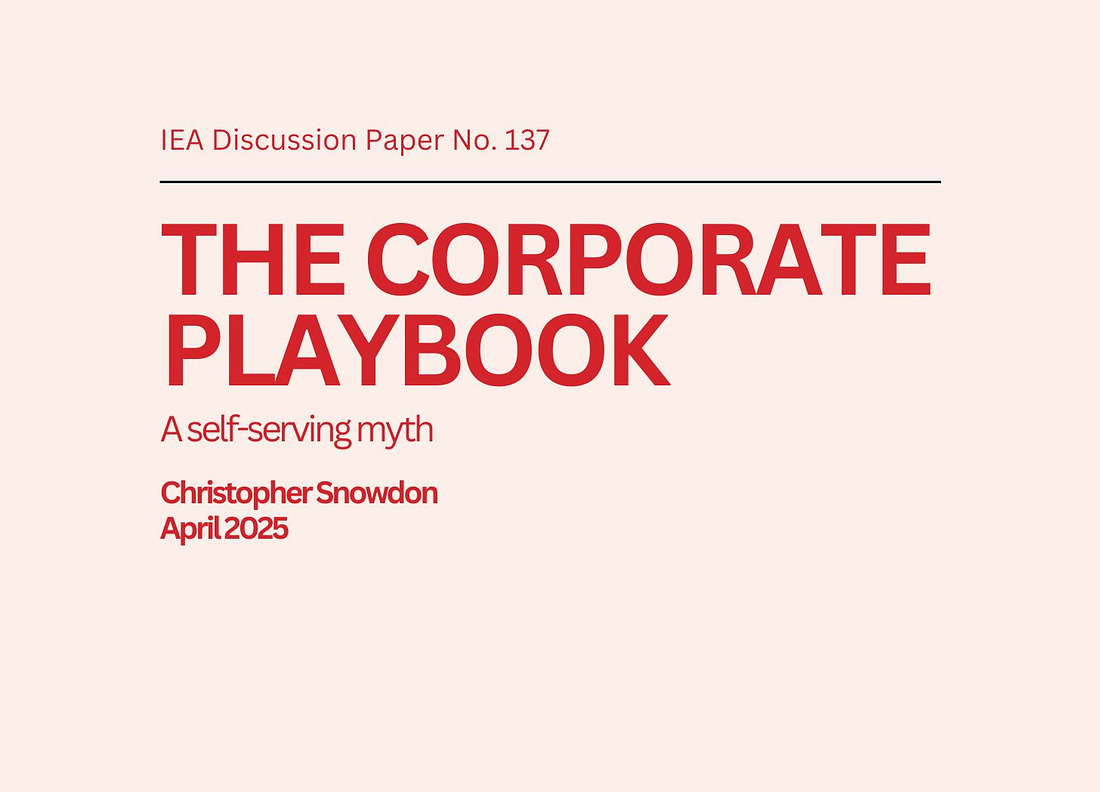|
By Christopher Snowdon
Public health academics claim industry tactics are uniquely harmful but provide no control groups or comparisons to non-industry actors.
The same political strategies are routinely used by public health campaigners themselves.
The 'corporate playbook' is a rhetorical device, not a meaningful contribution to political science.
A new paper from the Institute of Economic Affairs challenges the idea that “unhealthy commodity industries” like tobacco, alcohol, food and gambling follow a uniquely manipulative ‘corporate playbook’. The discussion paper, The Corporate Playbook: A Self-Serving Myth, argues that the tactics these industries are accused of using, including lobbying, coalition-building, media engagement and legal threats, are standard across all sectors, including NGOs and public health groups themselves.
Dr Christopher Snowdon, report author and Head of Lifestyle Economics at the Institute of Economic Affairs, says that the so-called ‘corporate playbook’ is not distinct to controversial industries, but reflects standard public affairs strategies.
Drawing on over a decade of public health literature, the paper critiques its most common framework — the Corporate Political Activity (CPA) taxonomy — and finds that it fails to demonstrate how these strategies differ at all from those used by non-industry actors.
According to the landmark study by Savell et al. (2014), the tobacco industry used six policy-influencing tactics between 1990 and 2013:
Information (direct and indirect lobbying; commissioning research; collaborating with government)
Constituency building (forming alliances with other sectors; media advocacy; creating front groups)
Policy substitution (developing alternatives to regulation, e.g. voluntary codes of conduct)
Legal (using or threatening legal action)
Constituency fragmentation (neutralising or discrediting opponents)
Financial incentives (gifts, inducements and promising future employment to policymakers)
The report includes examples of how public health campaigners routinely use the same six strategies ascribed to industry. These include lobbying policymakers, building coalitions, working with the media, collaborating with government departments, and discrediting opponents.
For example, the 2007 indoor smoking ban, campaigned for by the pressure group Action on Smoking and Health, used five of the six strategies listed in the “tobacco playbook” framework.
As argued by Dr Snowdon, “There is nothing special or unique about the political strategies attributed to the tobacco industry, let alone the other ‘unhealthy commodity industries’.”
The paper points to a double standard in the way political activity is described: “In this literature, it is common to see industry lobbyists described as ‘corporate actors’ or simply ‘lobbyists’ while public health lobbyists are ‘advocates’, ‘professionals’ or ‘experts’.”
Snowdon concludes that the ‘corporate playbook’ framing is not a serious analytical tool, but a rhetorical device designed to exclude certain stakeholders from the policy-making process. It is best understood as an activist tactic, not a serious attempt to advance our understanding of political science.
Dr Christopher Snowdon, Head of Lifestyle Economics at the free market think tank the Institute of Economic Affairs, said:
“Every industry from infant formula to mobile phones has been accused of using the so-called ‘tobacco playbook’ over the years. It is a fatuous insult that has lost all meaning. Academics who have tried to put some beat on the bones of this jibe have only succeeded in providing a definition of normal political activity. Phrases like ‘corporate playbook’ and ‘commercial determinants of health’ should be seen as a red flag for dogmatic activism.”
If you are interested in reading more like this, the conclusion of Chris Snowdon’s series ‘Killjoys’ is now available to paid Insider subscribers
You’re currently a free subscriber to Insider. For the full experience, upgrade your subscription.
Paid subscribers support the IEA's charitable mission and receive special invites to exclusive events, including the thought-provoking IEA Book Club.
We are offering all new subscribers a special offer. For a limited time only, you will receive 15% off and a complimentary copy of Dr Stephen Davies’ latest book, Apocalypse Next: The Economics of Global Catastrophic Risks.

